Best Golf Cart Batteries
Best Golf Cart Batteries
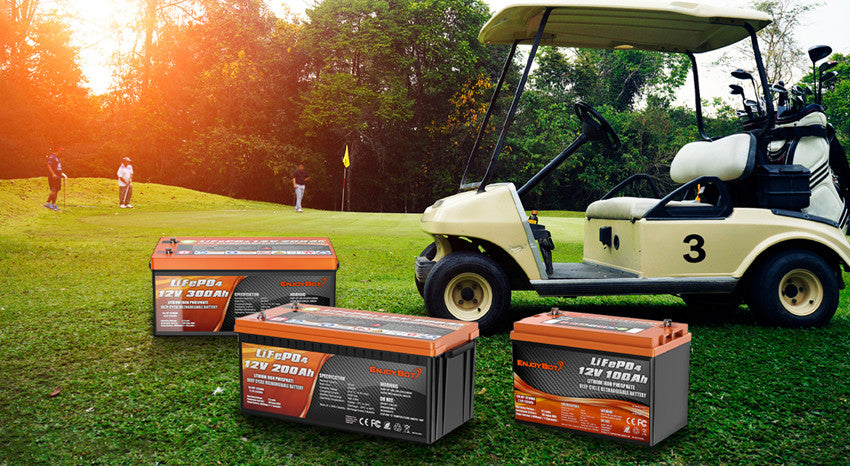
Golf cart batteries come in various sizes and types, they are the fuel that powers electric golf carts. Golfers are not the only ones using golf carts these days.
It is not uncommon to see people driving around in electric golf carts in many beach towns and retirement communities. They are also commonly used as maintenance vehicles in resorts, zoos, and parks where people on vacation don’t want to smell the fumes or hear the loud engines of traditional gas-powered vehicles.
You probably don’t spend much time thinking about the batteries in your golf cart, but understanding how they work and how to maintain them is critical to the performance of your golf cart. An electric golf cart's speed, acceleration, and runtime are all depending on the battery system configuration. Having a better understanding of the battery system will help you get the most out of your electric golf cart. Let’s dig in.
What Are Golf Cart Batteries?
On average, electric golf motors operate at 36V or 48V and draw between 50-70 amps of electric current while cruising at 15 miles per hour. Keep in mind that the electric current drawn during acceleration or while going up a hill is much higher. To keep you from getting stranded, golf cart batteries must provide a steady flow of high current for long periods. Additionally, your golf cart batteries may be going through full charge and discharge cycles daily. batteries drain below 50% is hard on them and often leads to a shortened lifespan and reduced performance.
Golf cart batteries are deep-cycle batteries designed and manufactured with additional durability to sustain prolonged current draw and frequent deep discharging. They are usually available in 6V, 8V, and 12-volt configurations that can be wired in series to provide the required voltage. For instance, six 6-volt batteries connected in series can provide 36 volts, or four 12-volt batteries can provide 48 volts. Typically, lower voltage batteries have a higher amp-hour capacity. For example, if you want to supply 48 volts for your golf cart motor, eight 6-volt batteries would have more capacity and work longer than six 8-volt batteries. That is because you are using more batteries overall.
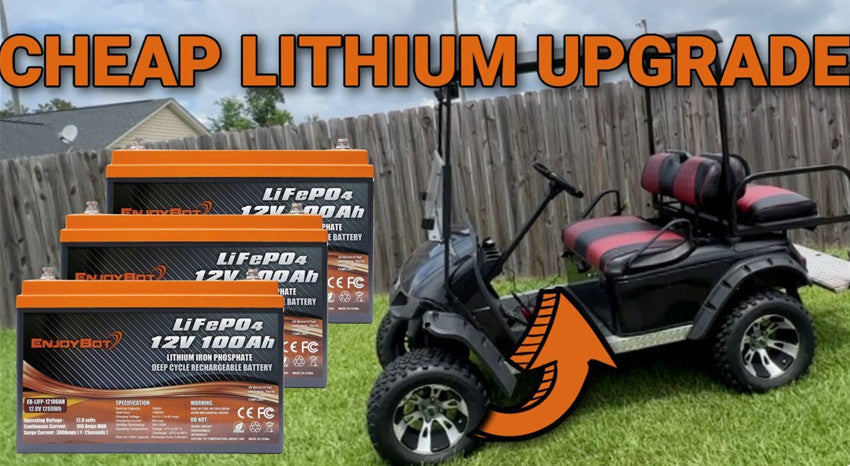
Can you use regular car batteries in your golf cart?
The answer is yes. Standard car batteries are 12 volts, and you could connect three or four of them in series to provide the required 36V or 48 volts to your golf cart motor.
However, car batteries are designed to provide a huge surge of current for short periods. The purpose of a car battery is to provide power while starting the engine. After that, the alternator will take over to power all of the electronics in the vehicle. Repeatedly draining a standard car battery below 50% will ruin it very quickly. While you can technically use standard car batteries in your golf cart, they probably won't last very long.
Alternatively, deep cycle batteries are explicitly optimized to supply a steady electric current output over long periods of time and repeatedly be deeply discharged. This makes the deep-cycle battery a much better choice for golf cart applications.
Types of Golf Cart Batteries
Lithium, Lead-Acid and AGM
Lead-acid, absorbed glass mats (AGM), and lithium-iron phosphate (LiFePO4) are the three main types of deep-cycle golf cart batteries. Each has benefits and drawbacks.
Lead-Acid
The lead-acid battery is the most common and lowest-cost deep-cycle battery for golf carts. It consists of a lead plate suspended in a sulfuric acid solution which creates a chemical reaction allowing the power energy to be stored. The main advantage of lead-acid batteries is that they have the lowest upfront cost. However, they have the shortest lifespan compared to other golf cart battery types, need the most maintenance, and are the heaviest.
AGM
Absorbed Glass Mat (AGM) batteries are a sealed variation of lead-acid batteries. In the AGM battery, the lead plates are placed between electrolyte-saturated fiberglass mat. AGM construction eliminates the requirement to refill the fluid in the battery and allows them to be sealed, making them leak-free. AGM batteries require less maintenance than conventional lead-acid batteries. However, AGM batteries can be significantly more expensive without offering much additional capacity.
Lithium-Iron phosphate batteries
These days, golf carts are universally using deep-cycle lithium-iron phosphate (LiFePO4) batteries. Don’t confuse them with lithium batteries found in small electronics. LiFePO4 batteries are safer, last longer, and are one of the most stable forms of lithium batteries. They are optimized to offer a steady electric current output.
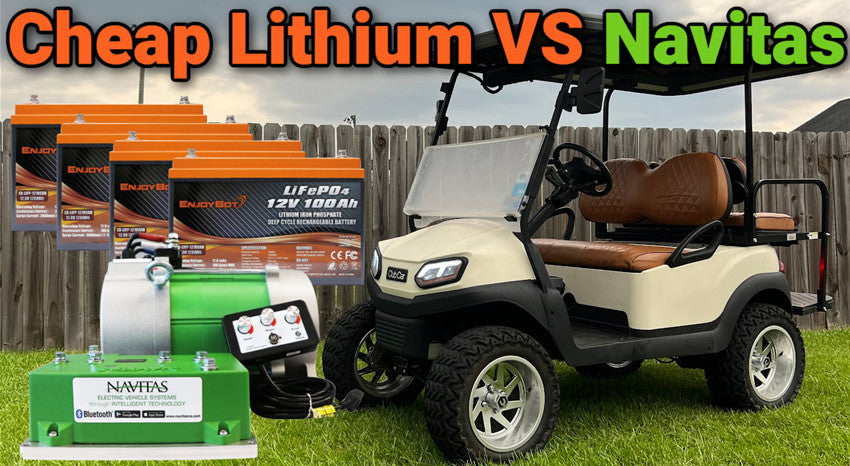
Best Batteries for the Golf Cart
Best Batteries for Your Golf Cart: Lithium-Ion
Lithium batteries offer many advantages over lead-acid and AGM batteries, such as an extended lifespan, zero maintenance, fast charging, 80%-98% deep cycle, significant weight reduction, increased efficiency, and an overall reduction in cost.
These benefits make LiFePO4 batteries the best option for golf cart batteries.
Converting your golf cart to run on lithium-iron phosphate (LiFePO4) batteries may involve some additional modifications to achieve optimal performance. Use a proper charger, LiFePO4 batteries can charge much faster than lead-acid and AGM batteries. Depending on what charger is in your golf cart, you may need to replace it with a charger optimized for LiFePO4 batteries.
As LiFePO4 batteries are discharged, their voltage doesn’t drop down. As we will discuss shortly, this is the main benefit. The only drawback here is that since the voltage doesn’t drop down, there is no warning that your battery is dying until it is dead.
Can I Use Enjoybot Batteries in My Golf Cart?
Yes, you can use Enjoybot lithium batteries in your golf cart. The Enjoybot battery has a continuous discharge current limit of 100 amps and can be discharged at up to 300 amps for 6 seconds. Exceeding these limits will cause the battery to cut off.
Enjoybot Batteries are all 12 volts. You will need to connect three of them in series for a 36 volts system or four in series for a 48-volt system. If your golf cart battery box is large enough, you can also wire additional batteries in parallel will provide additional run time capacity (You can connect four batteries in series at most ).
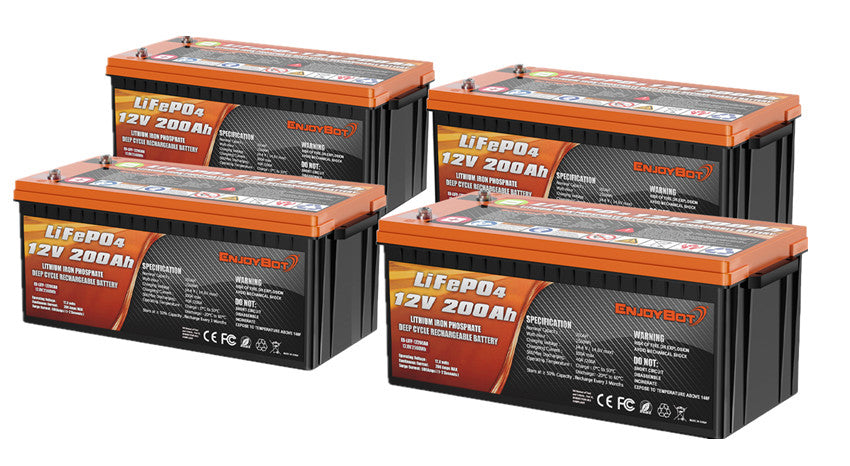
Benefits of Lithium Batteries over Lead-Acid
Lithium batteries offer many advantages over lead-acid batteries for golf cart applications. Let’s take a look at each of them in more detail.
Longer Lifespan and Warranty
When lead-acid batteries go through charge and discharge cycles, they can never be fully charged to their original capacity. Over time, they slowly wear out until the voltage drop down as we mentioned above is too great. When this happens, the battery can no longer power the golf cart, even when fully charged. However, this is not the case for lithium batteries.
LiFePO4 batteries typically last for five to ten times as long as lead-acid batteries. LiFePO4 batteries are true deep-cycle batteries with minimal impact on their lifespan as they go through repeated charge and discharge cycles. Enjoybot LiFePO4 batteries generally come with a 10-year warranty. Compare this to lead-acid batteries, which is usually only having a 2-3 year limited warranty.
More Energy Efficient
As we mentioned earlier, lithium batteries have a flatter voltage curve than lead-acid batteries. Lead-acid batteries can typically only be discharged to around 50% of their capacity before the voltage drop down is too significant and your golf cart dies. Conversely, lithium-iron phosphate (LiFePO4) batteries can discharge almost entirely with minimal voltage drop. This means that you can use almost the entire capacity of a lithium battery each time you charge it.
Additionally, golf cart lithium batteries can fully charge with the proper charger in around two hours, which is significantly faster than their lead-acid counterparts.
Less Heavy
LiFePO4 batteries are about half the weight of lead-acid deep-cycle batteries. Reducing the weight of your golf cart can increase your runtime, allowing you to spend more time driving and less time charging.
Less Overall Cost
Golf cart LiFePO4 batteries have a higher initial cost but often provide overall cost savings over time since they last 5 to 10 times longer than lead-acid batteries.
Safer
A significant risk in all types of batteries is thermal runaway. Thermal runaway causes damage to the battery and can even lead to a fire if it is not controlled quickly.
Lead-acid batteries offer no protection against thermal runaways. However, LiFePO4 batteries have an integrated battery management system known as BMS that helps regulate the battery’s temperature, monitors for internal shorts, and cut off the battery if thermal runaway is detected.
The advances in lithium-iron-phosphate battery technology have helped them become much safer than their lead-acid counterparts.
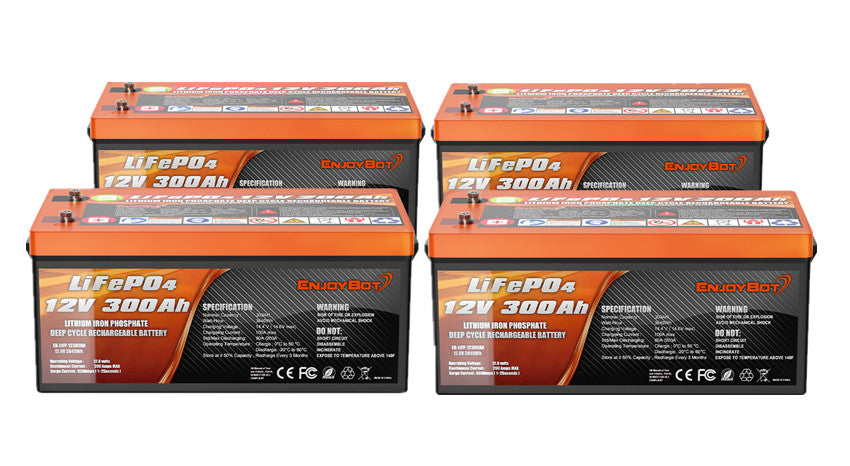
Conclusion
Whether you are heading out for a round of golf or cruising around the beach, having a reliable golf cart battery is critical. Nobody wants to get stranded.
LiFePO4 batteries offer a great option to keep your golf cart running longer while also minimizing maintenance requirements and saving you some money in the long run.
















![[Upgraded Version] Enjoybot 14.6V 20A Waterproof Mountable LiFePO4 Lithium Battery Charger For 12V LiFePO4 Battery](http://enjoybot.com/cdn/shop/files/14.6V_20A_Waterproof_Battery_Charger_1_360x.jpg?v=1752565609)
![[Upgraded Version] Enjoybot 14.6V 20A Waterproof Mountable LiFePO4 Lithium Battery Charger For 12V LiFePO4 Battery](http://enjoybot.com/cdn/shop/files/14.6V_20A_Waterproof_Battery_Charger_2_360x.jpg?v=1752637374)















